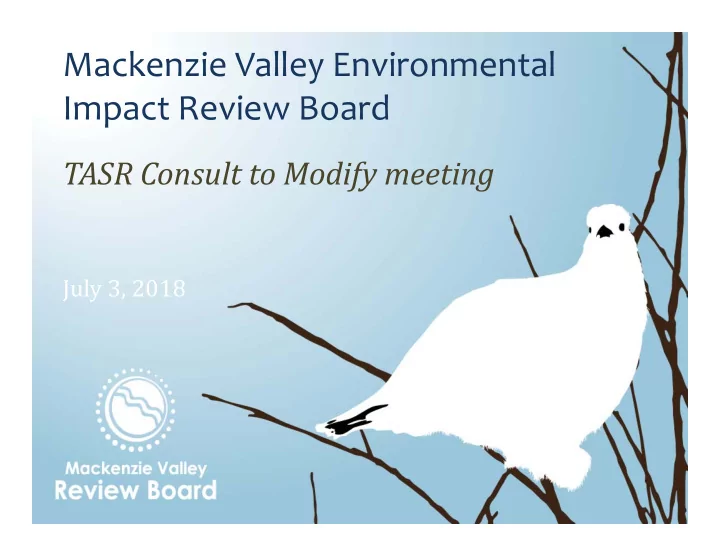

Mackenzie Valley Environmental Impact Review Board TASR Consult to Modify meeting July 3, 2018
Overview • Opening remarks from Board staff • Timeline • GNWT proposed modifications • T ł ı ̨ cho ̨ proposed modifications • Next steps
Timeline: consult to modify TASR measures March 29 : Report of EA issued June 22 : Minister and TG initiate consultation with Review Board on modifications to specific measures June 22 : Minister consults with Indigenous groups on modifications to measures July 3 : Board staff hosts meeting to discuss modifications proposed by Minister and TG July 23 : Review Board’s due date for comments on modifications from parties July 23 : Minister’s due date for comments on modifications from Indigenous groups
GNWT proposed modifications, Boreal Caribou Measures • 6‐1 Implement Recovery Strategy and Range Plan (p182) • 6‐2 No Hunting Corridor (p185) • 6‐3 Habitat Offset and Restoration Plan (p186)
Measure 6 ‐ 1 Recovery Strategy and Range Plans Preamble (p181): • Intent of measure – use of road does not occur before range plans are implemented (p181) • Full implementation of the recovery strategy and range plans would help to mitigate project effects to boreal caribou • Board finds that boreal caribou don’t have adequate protection to ensure population is self sustaining in the area of the project, or the NT1
Measure 6 ‐ 2 No Hunting Corridor Preamble (p184): • Intent – mitigate effects of hunting prior to effects taking place, when the road opens to public • Board finds that likely increased hunting will lead to significant adverse impacts to boreal caribou • Collectively – and considering the current status of boreal caribou ‐ the effects of the project lead to conservation concern
Measure 6 ‐ 3 Habitat Offset and Restoration Plan Preamble (p185): • Intent‐ to offset effects of the project to boreal caribou habitat. • Board finds that the project will likely have significant adverse impact on habitat • Concern with the amount of disturbance in the area • No proposed offsets or mitigations for habitat impacts • Builds on WRRB suggestion of using a 2500 m buffer
T ł ı ̨ cho ̨ Proposed modifications • 5‐2 Tłı̨chǫ monitoring, engagement and reporting of adverse health and well‐being impacts • 5‐6 Include Behchokǫ̀ in accident response planning • 8‐1 Integrated Fisheries Management Plan • 9‐1 Monitoring and reporting harvest • 9‐2 Cultural sensitivity in work camps
Measure 5 ‐ 2: T ł ı ̨ ch ǫ monitoring, engagement and reporting of adverse health and well ‐ being impacts Preamble: • Project will add stress to local health, social services in Whatì • Uncertainties in assumptions about effects on people • Effective response needs a timely understanding of how the road affects daily life and well ‐ being in communities • Measures required to address concerns, increase confidence • Part of measure is to make sure people who depend on country food are not adversely affected
Measure 5 ‐ 6: Include Behchok ǫ̀ in accident response planning Preamble: • Project is likely to increase the frequency and severity of road ‐ side accidents • Emergency response capability in Whatì and Behchok ǫ is necessary • GNWT is working with T ł ı ̨ ch ǫ Government, T ł ı ̨ ch ǫ Community Services Agency and Community Government of Whatì • Community Government of Behchok ǫ is a necessary partner
Measure 8 ‐ 1: Integrated Fisheries Management Plan Preamble: • An IFMP is required to prevent likely significant adverse impacts from increased access leading to increased fishing • Managing fisheries (including effective monitoring) is essential to preventing significant effects on fisheries and harvesting • Measure requires parties to work together to understand fisheries in the area and support appropriate mitigation, monitoring, and adaptive management
Measure 9 ‐ 1: Monitoring and reporting harvest Preamble: • builds on commitments in WMMP to monitor project ‐ specific mortality of wildlife • builds on recommendations from WRRB • protects the sustainable harvest of wildlife for Aboriginal people • mitigates impacts on Aboriginal harvesters • informs wildlife managers of wildlife populations in area of the Project
Measure 9 ‐ 2 Cultural sensitivity in work camps Preamble: • addresses concerns of cultural sensitivity and awareness for unknown independent contractor operating in T ł ı ̨ cho ̨ region for 29 years • mitigates impact on T ł ı ̨ cho ̨ culture and well ‐ being of residents • ensures culturally appropriate policies for contractors in Project work camps and T ł ı ̨ cho ̨ communities
Recommend
More recommend